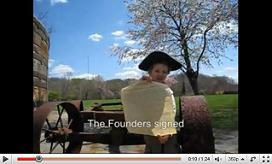Staff’s blog
Federal Judge Dale Kimball has issued a temporary restraining order barring the Lt. Governor and the clerks of all of the state’s 29 counties from making public the names of voters who signed the Utah Ethics Commission Initiative petition. A hearing has been set for April 28th to determine if the release of voter’s information violates their right to anonymous political speech.
You can read the order here.
As the Texans Taking Charge tour rolls on, I got the chance to travel to Longview, TX on April 5 and speak to the We the People of Longview, a grassroots non-profit organization similar to a Tea Party. I addressed a group of about 70 and their support for initiative & referendum rights was overwhelming. Mike & Cindy Schwartz established the group which began with about 6 people and has no
The latest development in Utah’s rapidly changing initiative rights, Utahans for Ethical Government has filed suit in U.S. District Court asking the court to block the public release of names of voters who signed their petition. The lawsuit, similar to Doe’s argument in the pending Doe v.
With Tax Day looming tomorrow, here’s a History Lesson From a 4 Year Old. We released this video last year on April 14th, and the message is still important. Check it out.
Colorado State Senator Abel Tapia currently has a proposal to change the way in which the Colorado State Constitution is amended. One of the changes would be to double the number of signatures required for citizens to put a constitutional amendment change on the ballot for a vote:
We’ve been telling you for some time about Maryland’s ridiculously strict requirements for a valid signature on a referendum petition. That requirement has taken out another effort by citizens to exercise their referendum rights in Howard County as 36% of their petition signatures were rejected.
Â
I’ve just completed an online interactive database of Missouri ballot measures from 1910 to 2008. The database allows you to see what measures have passed and failed, and search and sort for various scenarios. You can also generate a list of past ballot measures based on vote requirements you specify. This allows you to see the effect of various super-majority percentages.
Several years ago while myself and several other Wisconsin activists were working on the recall of a City of Milwaukee Alderman, the recall effort was going on during a regularly scheduled election so we told the group collecting signatures to stand just outside of the polling locations and approach the voters as they were going in to vote. This seemed like a simple and easy way to gather signatures because all of those going in to vote were residents of the district of the alderman that we were attempting to recall.
Richard Winger gives a great rundown at Ballot Access News of the many amicus briefs submitted in Doe v. Reed. The United States Supreme Court is being asked to decide whether signatures on initiative and referendum petitions are private or a matter of public record.
 Last November we awarded California Governor Arnold Schwarzenegger the John Lilburne Award for vetoing a series of bills that would have restricted petitioning rights in the state. Included among those bills was AB 436, sponsored by Assemblywoman Saldaña, that would have raised the filing fee for an initiative tenfold from $200 to $2000 over seven years.
Last November we awarded California Governor Arnold Schwarzenegger the John Lilburne Award for vetoing a series of bills that would have restricted petitioning rights in the state. Included among those bills was AB 436, sponsored by Assemblywoman Saldaña, that would have raised the filing fee for an initiative tenfold from $200 to $2000 over seven years.
While around the United States legislators and special interests seek to restrict citizens’ initiative & referendum petitioning rights, the European Union is expanding them. Joe Matthews of the New America Foundation notes:
The news here are the choices the Europeans appear to be making about how to structure the new signature gathering process. In almost every way, their process represents a vast improvement on what we have in California.
The Saginaw News has a piece in which Saginaw Valley State University political science professor Robert W. Lane and several Saginaw-area officials claim Michiganders’ ability to recall elected officials is too powerful and should be weakened.
Four years after winning independence from Britain, 55 delegates from the new American states completed the awesome task of drafting a new constitution. On September 18, 1787, one Mrs. Powel asked delegate Benjamin Franklin, “Well Doctor, what have we got, a republic or a monarchy?”  Dr. Franklin’s reply was both a warning and a commission to us, “A republic, if you can keep it.”
So, we’re supposed to have a “republic,” but what, exactly, does that mean? We better find out if we are to live up to Franklin’s charge to “keep it.”
One great thing about citizens being able to initiate their own proposed laws is the variety of topics that people take to the ballot box. On that note, an initiative circulating petitions in Columbia, MO is the first ever proposed to ban police use of Tasers. Supporters of the petition announced to chants of “We won’t be fooled again. Tasers have to go” that they will try to place the measure on the city’s November 2nd ballot.
Over the past few weeks we have been telling you about two Utah bills aimed at weakening the initiative petitioning rights of Utahans, and unfortunately Gov. Gary Herbert has decided to put his rubber stamp on both bills.
